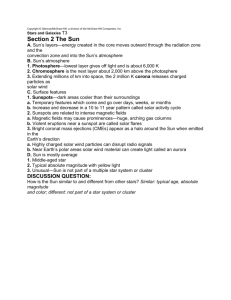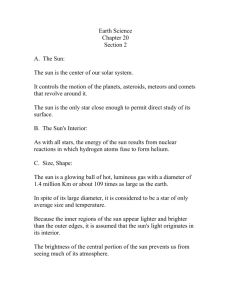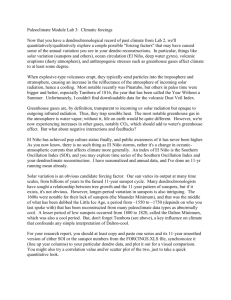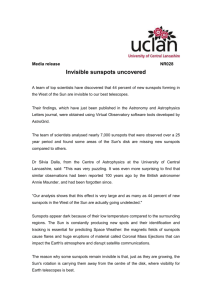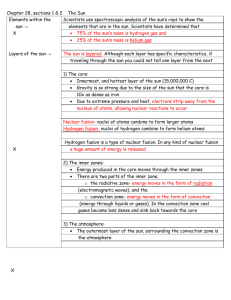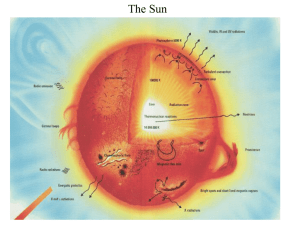Solar Cycle - SSHSPhyscialGeography11
advertisement
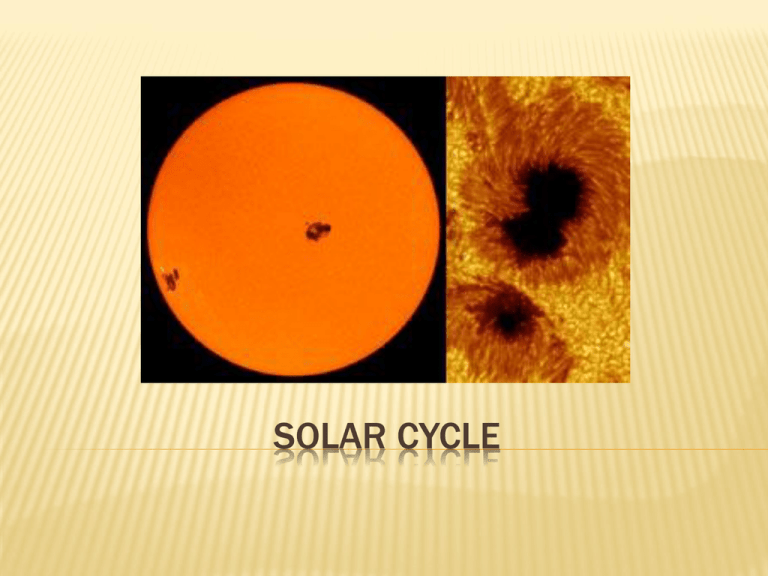
SOLAR CYCLE WHAT IS A SUNSPOT? Sunspots are darkregions that appear on the "surface" of the Sun. Sunspots are "dark" because they are cooler than their surroundings. A large sunspot might have a central temperature of 4,000 K (about 3,700° C or 6,700° F), much lower than the 5,800 K (about 5,500° C or 10,000° F) temperature of the photosphere HOW BIG IS A SUNSPOT? HOW BIG IS A SUNSPOT? Sunspots are very large structures. Although they look small against the backdrop of the Sun, which has a diameter of 1.4 million km (870 thousand miles), most sunspots could swallow a planet. Many sunspots, like the ones shown in the image, are as large as Earth! Most spots range in size from about 1,500 km (932 miles) to around 50,000 km (31,068 miles) in diameter. Occasionally gigantic sunspots the size of Jupiter appear on the Sun's "surface". Astronomers believe some other stars also have spots. Young stars seem especially likely to have large numbers of starspots, and some of those may be immense. WHAT IS THE SOLAR CYCLE WHAT IS THE SOLAR CYCLE The observations of sunspots Sunspots are not constant (due to rotation, new one form, old ones fade away) Sunspots occur in an eleven year cycle Reflects the 22 year cycle for the reversal of the sun’s magnetic field. The migration of the sunspots has a butterfly effect STUDYING THE SOLAR CYCLE In 1848 Johann Rudolf devised a method of counting sunspots on the solar disc called the Wolf Number (averaged from many observing sites) The cycle appears to be uniform this century; however, in 1645-1715 there was few sunspots present ( Maunder Minimum) WHY IS THERE A SOLAR CYCLE? No one knows the answer to this question A detailed explanation of the solar cycle is a fundamental physics problem waiting to be solved. SOLAR CYCLE VARIATIONS AND EFFECT ON EARTH’S CLIMATE For more than 100 years scientists have wondered if cycles on the sun and solar irradiance (or energy) received at Earth because those cycles affect weather or global climate on Earth. SOLAR CYCLE VARIATIONS AND EFFECT ON EARTH’S CLIMATE It is now thought that the solar cycle does not play affect weather, but they do have a slight effect on global climate ( but not enough to explain recent global warming) MAUNDER MINIMUM AND ITS EFFECT ON EARTH’S CLIMATE This was the largest well-documented disruption in sunspots observed in history Europe and parts of North America were struck by spells of remarkably cold weather at roughly the same time. The “Little Ice Age” extended from 1350-1850, and some of its coldest periods coincide with times of decreased sunspots ACTIVITY: PLOTTING/GRAPHING SUNSPOTS Follow the directions on the worksheet-BUT ONLY PLOT YEARS 1926- 2007 Make sure to answer all the questions on a separate piece of paper. For question #2a- only do 1926-present NOT 1700s- present
